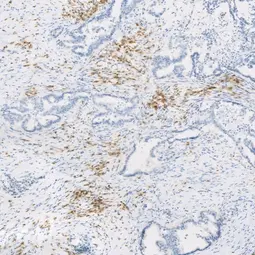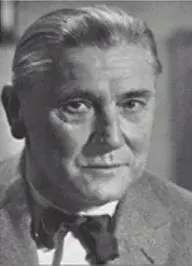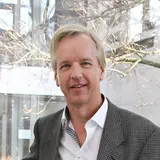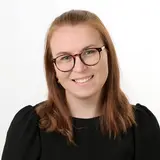Molecular Oncology of Gastrointestinal Tumors
- Immunology, Infection and Cancer

Prof. Dr. Rienk Offringa
Group Leader
T-cell immunotherapy is emerging as a promising strategy for the treatment of pancreatic cancer. Even though this cancer type is less immunogenic than for instance melanoma and lung cancer, we have demonstrated the presence of tumor-reactive T-cells in patient samples, as well as in clinically relevant mouse models. Our aim is the development of strategies to harness this T-cell response in the context of (neo)adjuvant treatment of patients with primary resectable disease.

Our Research
The Division ‘Molecular Basis of Gastrointestinal Tumors’ was founded with the support of the K.H. Bauer Foundation. Our laboratory is closely associated with the European Pancreas Center of Heidelberg University Hospital, one of the leading pancreatic surgery clinics in the world. Furthermore, we have a long-standing collaboration with the Department of Pancreatic Surgery at Union Hospital, Tongji Medical College, Wuhan, China. Our research focuses on the development of new therapies for pancreatic cancer, in particular pancreatic ductal adenocarcinoma, for which still no satisfactory treatment options are available. Surgical resection of the primary tumor, the only intervention that provides patients a perspective for prolonged survival, is merely available to approximately 20% of patients, because in the majority of cases the disease has already spread to nearby tissues at the time of diagnosis. However, also patients successfully treated by surgery rarely survive longer than 5 years, due to the devastating disease recurrence rate. For patients with recurrent disease, palliative chemotherapy is the only option. The same applies to patients diagnosed with non-resectable disease, due to the complexity of the tumor microenvironment that renders the tumor resistant to various treatment regimens, including cytostatic and immunotherapeutic strategies.
In view of this clinical reality, our research focuses on the development of new neo-adjuvant and adjuvant treatment strategies aimed at increasing the fraction of patients eligible for surgical treatment and at combatting post-surgery disease recurrence. Our lab. was one of the first to show that, in contrast to generally prevailing views, pancreatic tumors harbor tumor-reactive T-cells that can be isolated from patient tumor samples and/or mobilized in vivo through combinations of targeted cytostatic and immunostimulatory drugs. Our current efforts primarily focus on the following two topics:
The identification and molecular cloning of tumor-reactive T-cell receptors (TCRs) by means of single cell RNA-sequencing (scRNA-seq) from human and mouse tumor samples, followed by the in-depth analysis of the antigen-specificity and therapeutic potential of these TCRs for personalized therapy through the infusion of autologous, genetically engineered T-cells (TCR gene therapy).
The exploration in clinically relevant mouse tumor models of synergistic combinations of drugs that target different mechanisms driving the malignancy of pancreatic cancer, in particular tumor cell growth, the tumor nurturing influence of the tumor microenvironment, and immunosuppressive pathways.
For both sub-projects, our research is placed in the context of surgical resection of the primary tumor. The TCR gene therapy approach is based on the isolation of tumor-reactive TCRs from the resected tumor specimen, and the infusion of engineered T-cells is aimed at destruction of the remaining disseminated tumor cells with the objective to prevent early disease recurrence. The synergistic drug combinations are applied in the neoadjuvant and adjuvant setting to limit the residual disease load after resection, as well as to optimize the impact of genetically engineered T-cell therapy.
In view of this, we closely collaborate with the aforementioned pancreatic surgery clinics and, for our pre-clinical experiments, make use of an in-house developed, autochthonous mouse model that allows surgical resection of primary pancreatic tumors.
K.H. BAUER FOUNDATION

In the course of 2011, Prof. Dr. Otmar D. Wiestler, scientific director of the German Cancer Research Center, and Prof. Dr. Markus Büchler, head of the Dept. of Surgery at the University of Heidelberg and of the European Pancreas Center, decided to create an endowed professorship to fulfill the urgent need for a coordinated, interdisciplinary research program focused on the development of new treatment options for pancreatic cancer. Funding of this chair was based on a sum of money that had been collected by Prof. Dr. K.H. Bauer.
Prof. Karl Heinrich Bauer was one of the founders of the German Cancer Research Center (DKFZ) in Heidelberg.
After his medical studies, K.H. Bauer specialized in surgery, at least in part due to the urgent need for surgeons during World War I. After the war, he specialized in genetics, a study that brought him on the path of cancer research. In 1928, he published his first paper on cancer, ‘Die Mutationstheorie der Geschwulstbildung‘ (The role of genetic mutations in Cancer). He was appointed as professor in Breslau in 1933, where surgery was his main focus of research.
On 1 January 1943, K. H. Bauer became the head of the Surgery Clinic of the University of Heidelberg. At the conclusion of World War II, when the American troops marched into Heidelberg, the university was closed down. On 15 August 1949, under Bauer's leadership and with new statutes, the University of Heidelberg was the first German university to re-open.
In the following years, Bauer dedicated more of his time on cancer research. In 1949, he published ‘Das Krebs Problem’ (The Cancer Problem), a comprehensive study on the problems and solutions in oncological research. This paper, and a subsequent monograph published in 1963, gave him an international reputation in the field of oncology. Today K.H. Bauer is considered one of the pioneers of modern oncology. He was one of the founders, in 1964, of the German Cancer Research Center (DKFZ).
K.H. Bauer is also considered a leader in the development of rescue work. He developed the ‘Klinomobils’, surgical operation rooms on wheels, forerunners of the modern emergency rescue vehicles.
Team
16 Employees
-

Prof. Dr. Rienk Offringa
Group Leader
-
Hongkun Cai
-
Alina Fritz
-
Aline Konrad
-
Janne Kühner
-
Claudia Lauenstein
-
Francesca Lucato
-
Zibo Meng
-
Janina Rebmann
-
Sofie Riedmann
-
Aaron Rodriguez Ehrenfried
-
Antonia Schach
-

Jennifer Schmidt
-
Bruno Schönfelder
-
Laura Katharina Steffens
-
Dr. Stefan Zens
Publication
Meng Z, Rodriguez Ehrenfried A, Tan CL, Steffens LK, Kehm H, Zens S, Lauenstein C, Paul A, Schwab M, Förster JD, Salek M, Riemer AB, Wu H, Eckert C, Leonhardt CS, Strobel O, Volkmar M, Poschke I, Offringa R.
Baumann D, Drebant J, Hägele T, Burger L, Serger C, Lauenstein C, Dudys P, Erdmann G, Offringa R
Poschke IC, Hassel JC, Rodriguez-Ehrenfried A, Lindner KAM, Heras-Murillo I, Appel LM, Lehmann J, Lövgren T, Wickström SL, Lauenstein C, Roth J, König AK, Haanen JBAG, van den Berg J, Kiessling R, Bergmann F, Flossdorf M, Strobel O, Offringa R.
Baumann D, Hägele T, Mochayedi J, Drebant J, Vent C, Blobner S, Noll JH, Nickel I, Schumacher C, Boos SL, Daniel AS, Wendler S, Volkmar M, Strobel O, Offringa R.
Poschke I, Faryna M, Bergmann F, Flossdorf M, Lauenstein C, Hermes J, Hinz U, Hank T, Ehrenberg R, Volkmar M, Loewer M, Glimm H, Hackert T, Sprick MR, Höfer T, Trumpp A, Halama N, Hassel JC, Strobel O, Büchler M, Sahin U, Offringa R.
Get in touch with us


